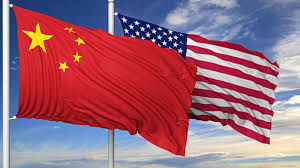
The weakening of the Chinese economy was cited to be the incentive for the country to come to a trade agreement with United States, said the US President Donald Trump on Sunday and added that the talks on a trade deal with Beijing are going “very well,” citing the weakening Chinese economy as an incentive for the nation to reach an agreement with the U.S.
“The tariffs have absolutely hurt China very badly,” Trump told reporters outside the White House before leaving on Marine One for a trip to Camp David. “I think China wants to get it resolved. Their economy’s not doing well.”
Starting middle of last year, US and China have been embroiled in a tit for tat trade war with both sides imposing tariffs on each other’s goods worth billions of dollars. The trade was initiated by the Trump administration over allegations against China that it was stealing intellectual properties and technology of American companies operating in China through its trade policies. The tariffs imposed by Washington was rebutted by Beijing with its own tariffs on a host of American products.
The global markets in addition to the U.S. and Chinese economies have been affected by the trade war between the world’s two largest economies. Both the countries have initiated measures to shore up their economy with the Chinese central bank announcing last week of a reduction of 1 per cent in the reserve requirements of banks. The US stock markets have been very volatile because of the trade war uncertainty in recent weeks.
On the other hand, the impact of the ongoing trade war was cited by some U.S. companies as the factor for weaker sales in recent quarters. For example, last Thursday, US tech giant Apple issued a profit warning for its quarterly revenue for the holiday sales season saying that it would be lower than it had expected partly because of the trade tariffs. This warning resulted in a drop of almost 10 per cent in the shares of the company.
On the other hand, US auto makers Ford and General Motors have that both have suffered additional costs of about $1 billion because of the trade tariffs. Rival car maker GM announced in November its plans of retrenchment of almost 15,000 jobs in the U.S. and Canada and close down a number of its production units in this region.
At the beginning of November, Trump and Chinese President Xi Jinping announced a 90 day truce in the trade war between the countries according to an agreement between the two leaders to allow both sides to try and find a solution to the trade spat. The 90 day period ends on March 1 and trade representatives from the two sides are scheduled to start negotiations for a trade deal this week.
(Source:www.foxbusiness.com)
“The tariffs have absolutely hurt China very badly,” Trump told reporters outside the White House before leaving on Marine One for a trip to Camp David. “I think China wants to get it resolved. Their economy’s not doing well.”
Starting middle of last year, US and China have been embroiled in a tit for tat trade war with both sides imposing tariffs on each other’s goods worth billions of dollars. The trade was initiated by the Trump administration over allegations against China that it was stealing intellectual properties and technology of American companies operating in China through its trade policies. The tariffs imposed by Washington was rebutted by Beijing with its own tariffs on a host of American products.
The global markets in addition to the U.S. and Chinese economies have been affected by the trade war between the world’s two largest economies. Both the countries have initiated measures to shore up their economy with the Chinese central bank announcing last week of a reduction of 1 per cent in the reserve requirements of banks. The US stock markets have been very volatile because of the trade war uncertainty in recent weeks.
On the other hand, the impact of the ongoing trade war was cited by some U.S. companies as the factor for weaker sales in recent quarters. For example, last Thursday, US tech giant Apple issued a profit warning for its quarterly revenue for the holiday sales season saying that it would be lower than it had expected partly because of the trade tariffs. This warning resulted in a drop of almost 10 per cent in the shares of the company.
On the other hand, US auto makers Ford and General Motors have that both have suffered additional costs of about $1 billion because of the trade tariffs. Rival car maker GM announced in November its plans of retrenchment of almost 15,000 jobs in the U.S. and Canada and close down a number of its production units in this region.
At the beginning of November, Trump and Chinese President Xi Jinping announced a 90 day truce in the trade war between the countries according to an agreement between the two leaders to allow both sides to try and find a solution to the trade spat. The 90 day period ends on March 1 and trade representatives from the two sides are scheduled to start negotiations for a trade deal this week.
(Source:www.foxbusiness.com)





